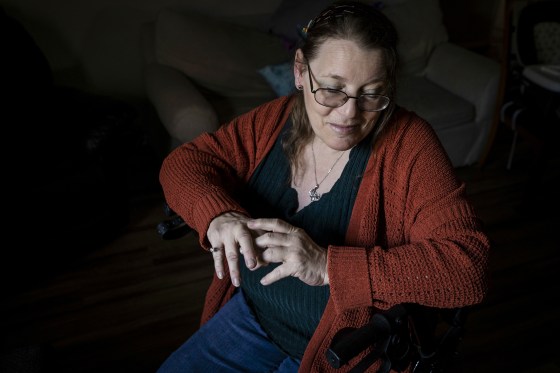WASHINGTON — The Supreme Court grappled Wednesday with whether a disability rights campaigner can sue hotels for failing to disclose accessibility information if she doesn't plan to actually book a room.
The case, involving activist Deborah Laufer, could curtail the ability of "testers" to bring lawsuits to benefit the disabled community as a whole by ensuring hotels comply with the Americans with Disabilities Act, known as the ADA.
During the oral argument, some justices appeared skeptical that Laufer faced discrimination just from searching online to see whether a hotel listed accessibility information.
Lurking in the background is another legal question about whether the Supreme Court should even decide the case, in part because Laufer has withdrawn her lawsuit and the ownership of the hotel in question has changed. It was unclear whether the justices would take that approach, which would leave the broader legal issue unresolved.
The court heard an appeal brought by Acheson Hotels, which operated the Coast Village Inn and Cottages in Maine when the lawsuit was filed. The hotel's lawyers argued that Laufer does not have legal standing to bring the cases because she has no intention of staying at the hotels.
Laufer, who is disabled and uses a wheelchair, said in her 2020 lawsuit that the hotel’s website did not identify accessible rooms and did not provide other relevant information.
But she had failed to show that she suffered an injury, a requirement necessary to establish standing, the hotel’s lawyers argued.
During the argument, justices debated what plaintiffs like Laufer would need to allege to show that they have suffered injuries, including whether they would need to try to book rooms or have concrete plans to visit the areas where the hotels are located.
Conservative Justice Neil Gorsuch suggested that "spending the afternoon clicking through these things" online was not sufficient to establish standing.
Justice Brett Kavanaugh, another conservative, expressed similar sentiments, wondering whether people "actually experience discrimination" when they go to websites and find out that they would be discriminated against if they physically went to the hotels.
Similarly, liberal Justice Ketanji Brown Jackson brought up the Civil Rights Movement and questioned whether a Black person who witnessed a restaurant's refusing to serve Black people would be able to sue without personally trying to sit down and order food.
She suggested that in the case before the court, Laufer is more like the person witnessing discrimination than the person experiencing it directly.
But Justice Sonia Sotomayor, one of Jackson's liberal colleagues, appeared sympathetic to the idea that Laufer would have been injured purely by the lack of accessibility information on the hotel website.
"I thought discrimination means I am being treated differently than other people," she said. "If I go on a drive to a place and there's a sign up that says 'no disabled person is welcome,' I've been discriminated against, correct?"
A federal district court threw out Laufer's lawsuit on standing grounds, but in a ruling last year, the Boston-based 1st U.S. Circuit Court of Appeals revived her claim.
Acheson’s lawyers noted in court filings that Laufer has filed more than 600 lawsuits targeting small hotels and bed-and-breakfasts. Litigation costs can be substantial for small businesses facing such claims, they said.
Laufer’s lawyers countered in their own court papers that the language of the ADA allows for anyone who is disabled and therefore subject to discrimination on that basis to sue if an entity has violated the law.
Without such lawsuits, hotels would have no incentive to comply with the ADA, the lawyers said.
The Biden administration has sided with the hotel on that point in a brief filed in the case, with Solicitor General Elizabeth Prelogar writing that by only viewing hotel information, Laufer had not suffered an injury.
But Prelogar defended the ability of testers to enforce civil rights laws more generally, citing a 1982 case in which the Supreme Court upheld the ability of testers to bring lawsuits challenging housing discrimination.

